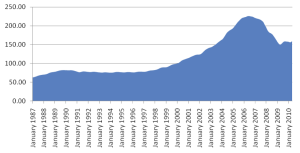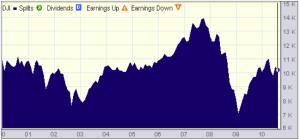(from late 2010)
How to Earn 18% Without Buying A Single Stock
I recently put one of my townhomes on the market to sell. It has been completely remodeled and is in a great location at a price that is the lowest in the area and by far the cheapest when compared to similar units in square footage, location and finish out. (no, I’m not trying to sell you my home ☺ )
I have marketed my home on every real estate site out there and even lowered the price of my unit to the cheapest in my building. The home is located in one of the densest and most desirable areas of Dallas Texas. even after all that and 40 days on the market, I have had 1 showing I’m not looking for pity at all, in fact, taking this frustration in stride I realized, there is some real deals to be had out there.
You see, , I am also looking to buy another property and boy do I have a selection, including penthouse condos in the nicest part of town that were once selling for $300,000 and up are now priced below $120,000 in some cases. The plethora of inventory and current weak state of the American consumer and would-be home buyer has created an enormous opportunity for those who have a little faith, knowledge, patience and willing look for value.
The real value may not be from the sellers like me that are looking to unload their homes and move on, but mostly from the banks, lenders, struggling homeowners and Fannie Mae who currently have a glut of properties on their books that they need to unload.
The thing is that banks and even Fannie Mae are not in the business of buying and selling homes. their job is simply to lend money or insure those notes for the borrowers who have now jumped ship and offered their deeds in exchange for the monies owed.
Many of the banks we know have already taken enormous write-downs on these bad loans and the next step is to move them off the books and get whatever cash they can. This means exceptional deals for you and me and what’s even better is that we can buy these homes not only at a relatively cheap price, but we get to leverage our money at a very low cost (interest rates are at a 40 year low) and collect dividends through rent, which can actually pay for our ownership, while you wait for values to rise. If values don’t rise, remember that you can still reduce your cost every-month through rent and take legal tax deductions on the money borrowed as well as any repairs you need to do.
REO’s, Foreclosures and Short-Sales.
While most realtors may steer you away from these types of sales because of the extra-work sometimes needed to execute a contract as well as the possibility of reduced commissions, you shouldn’t ignore the values they offer.. REO’s and Foreclosures are generally the most attractive because the banks have either already taken full control of the property or they are in the process of doing so and want to get that asset off their books. A Short-sale is when the owner of the property is negotiating with the bank to sell the home and satisfy the note for an amount lower than what they owe. Those are sometimes a bit tougher to complete, but may also offer great profit opportunities.
Lower Volatility
The equity markets can be quite volatile and have the ability to fluctuate +- 2-3% daily. That can create a ton of headaches, not to mention spook you into exiting a position because you don’t want to see your investment lose more value. The real estate market is much less volatile than the Dow Jones Industrial Average. That doesn’t mean we didn’t have a bubble in the real estate market, the likes of which have not been seen in decades. However, Bubbles tend to occur less frequently in the overall real estate market and this recent bubble has corrected itself.
Case-Shiller 10 City price index from 1987 till today

Dow Jones Industrial Average from 2000 till today

How do you go about it?
Just because real estate is cheap, it doesn’t mean you need spend 300k on a fancy new condo! Think small, remember that the more affordable it is to you, the more affordable it will be to the masses. , I suggest keeping your investments under 150k (preferably 100k) and in dense, desirable areas where you can find renters and lots of potential buyers.
In the major cities acro
ss the US, renters are in vogue and if you can pick yourself up a clean unit or fixer upper in a nice neighborhood, you may discover a gem. Fannie Mae properties also offer financing called Homepath loans, which are flexible in terms, cheaper to complete and have lower rates even for people with less than perfect credit. They even offer repair financing if you want to incorporate that into your loan. Check out homes and programs here http://www.homepath.com/
If you can live in the home, then of course you can spend a bit more, but look to save on what you are currently spending if at all possible and either pay down the principal on the new mortgage or buy some other investments with your extra cash.
But let’s assume you are looking for a pure investment property, don’t forget to check with the township or realtor to find out what the home has sold for in the past to ensure your getting a good deal.
So here is what your investment might look like:
Let’s say you find a home for 100k
You put 10% down, which is a $10,000 investment, similar to what many of us may put into the stock market. (you can put more or less down, if you are doing conventional financing through FHA. With Homepath, you can put as little as 3% down, although you may be required to pay PMI if you put down less than 20%)
That means you are financing $90,000. Let’s assume you finance it at a 4.5% rate (current 30 year rate). This will cost you $456.00 per month
Taxes will vary, in Dallas TX for example; you can expect to pay around $200.00 per month
You may or may not have to pay a condo fee, but let’s assume its $100.00 per month
You total monthly cost in this property would be around $756.00
Of course you should do this math before hand when figuring out if this is a good deal, and whether you can rent the property for $900.00 per month., remember you can also deduct mortgage interest and some repairs, upgrades and depreciation, but check with your accountant on those!
In this case you are making about $1800 per year on your $10,000 investment, that’s 18% annually you could received to pay down your debt on an asset that you now own and should begin to appreciate in value moving forward.
Of course there are no guarantees and you have repairs to make, but if you keep a renter in the home, eventually you will own the home free and clear and whatever you sell the home for would be pure profit!
That 18% is more than you could make in the stock market. In fact, if you bought the Dow Jones in August 2000, you have lost 9%, not to mention the money you spent on Maalox. This is one reason why diversifying your portfolio makes perfect sense.